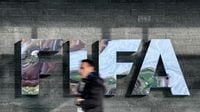The build-up to the 2026 FIFA World Cup, already touted as the biggest tournament in football history, has taken a dramatic turn off the pitch. Less than two months before the much-anticipated group-stage draw in Washington D.C., the United States government has denied entry visas to key members of Iran’s football delegation, igniting a global firestorm of criticism and raising uncomfortable questions about the intersection of politics and sport.
The controversy erupted on October 4, 2025, when it was confirmed that Amir Ghalenoei, head coach of Iran’s national football team, and Mehdi Taj, president of the Iranian Football Federation (FFI), along with seven other high-ranking officials, were refused visas by U.S. authorities. The denial comes at a time when world football’s governing body, FIFA, is preparing to stage its largest-ever tournament—48 teams, three host nations, and unprecedented global attention. But instead of celebration, the focus has shifted to political conflict and allegations of double standards at the heart of the beautiful game.
According to FFI spokesman Amir-Mehdi Alavi, “The list includes federation president Mehdi Taj, national-team coach Amir Ghalenoei, and seven other officials.” The FFI wasted no time in appealing directly to FIFA President Gianni Infantino, urging him to intervene and overturn the U.S. government’s decision. With the draw scheduled for December 5, 2025, in the U.S. capital, the stakes could hardly be higher for Iran’s football leadership.
For many observers, the U.S. move is more than just a bureaucratic hurdle—it’s a test of FIFA’s much-touted independence and its stated mission to keep politics out of football. Social media platforms exploded with outrage as the story broke, with users around the world condemning what they saw as blatant political interference. “Israel bombs civilians yet is allowed to play, while Russia was banned immediately after the war began. This double standard exposes FIFA’s hypocrisy,” wrote a user named ferizandra on X, capturing the mood among many football fans who see FIFA’s actions as inconsistent at best.
Another prominent voice, Athousand Brains, didn’t mince words: “The U.S., acting on Israel’s orders, blocked the Iranian delegation from attending the draw ceremony. It’s always been a mistake to give a colony the right to host major tournaments like the World Cup.” Such comments underscore the depth of feeling on both sides of the debate, with critics accusing the United States of using its position as host to further political goals rather than foster international unity.
Leila Hamed, a journalist for the Spanish outlet Marca, added fuel to the fire with a pointed critique: “The U.S. doesn’t deserve to host the World Cup because it’s using the event to whitewash genocide in Gaza. Instead of punishing Israel, countries that stand for humanity are being excluded.” Hamed’s remarks reflect a broader sense of frustration among those who believe that FIFA has failed to apply its rules evenly, especially when it comes to matters involving Israel and its critics.
FIFA President Gianni Infantino attempted to quell the storm following a recent council meeting, but his comments did little to calm the waters. “FIFA cannot solve geopolitical problems, but it can and must promote peace and unity through cultural and human values,” Infantino stated. The vagueness of his response only seemed to inflame critics, who saw it as an evasion rather than a solution. Online, the backlash was swift and fierce. The global football satire account Troll Football, boasting over 500 million followers, posted an edited FIFA logo featuring the Nazi Germany flag. The post went viral, shared more than 39,000 times and viewed by over two million people within just 17 hours. The comments section quickly filled with accusations that FIFA was aligning itself with “discriminatory political agendas” and demands for real accountability.
The issue has also drawn attention to the broader implications for the 2026 tournament itself. With 11 of the 16 host cities located in the U.S., American visa and entry policies could have a profound impact on how the World Cup is experienced by players, officials, and fans from countries with strained relations with Washington. Earlier this year, rumors swirled about whether Iran’s participation in the tournament could be threatened altogether due to these entry restrictions. While FIFA has insisted that no qualified team will be excluded, the current crisis has done little to reassure those who worry about the politicization of global sport.
Adding further complexity, former U.S. president Donald Trump recently declared that the United States would “block any attempt to ban Israel” from the tournament. This statement has only heightened the sense of political tension, especially among nations and fanbases who feel their concerns have been sidelined or ignored. Analysts point out that, while the World Cup is supposed to be a celebration of international unity and competition, it is increasingly being shaped by the geopolitical realities of its hosts.
For Iran, the visa denial is just the latest in a long line of obstacles encountered on the global stage. Relations between the United States and Iran have been fraught for decades, and visa restrictions on Iranians were further tightened under the Trump administration. Yet in the world of football, where the mantra “Football for All” is supposed to reign supreme, many are asking whether the current situation represents a fundamental betrayal of the sport’s core values.
Sports analysts warn that this episode may become one of FIFA’s most serious ethical and reputational crises in recent memory. The organization is already under scrutiny for its handling of other contentious issues, including the banning of Russia after its invasion of Ukraine while allowing Israel to participate despite ongoing conflict. The perception of double standards, coupled with the latest controversy over Iran, threatens to overshadow the tournament’s historic expansion and cast a long shadow over the event itself.
As international media and fans continue to debate the merits of the U.S. government’s actions and FIFA’s response, one thing is clear: the 2026 World Cup will be remembered not just for the football on the pitch, but for the political battles being waged behind the scenes. With the draw still set for December and the situation evolving by the day, all eyes are now on FIFA and the U.S. government to see how, or if, they will resolve a crisis that has put the sport’s most cherished ideals to the ultimate test.
For now, the world waits—hopeful that the spirit of the game can prevail over politics, but all too aware that the outcome is far from certain.




